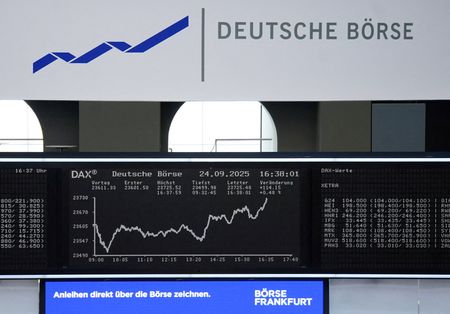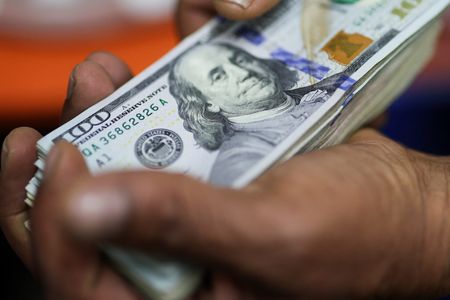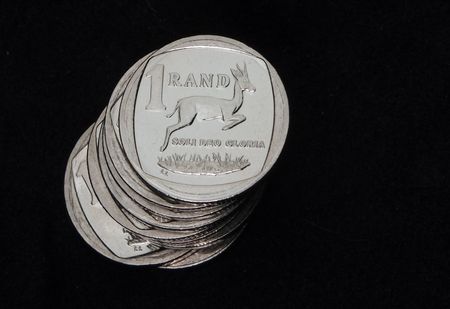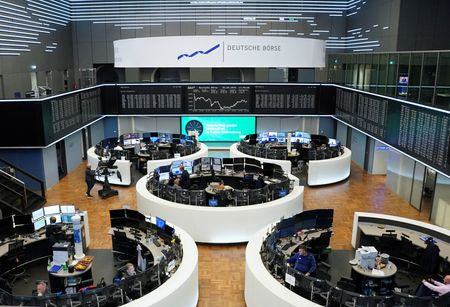By Dhara Ranasinghe and Rocky Swift
LONDON (Reuters) -Caution prevailed in world markets on Tuesday, with the dollar and equities slipping and gold hitting another record high amid fears a U.S. government shutdown could delay key jobs data.
The dollar was broadly weaker, European stocks were lower in early trade and U.S. equity futures fell a day after U.S. Vice President JD Vance said the government appeared “headed to a shutdown” after little progress in budget talks between President Donald Trump and Democratic opponents.
A government closure would delay the issue of Friday’s key employment numbers, putting the spotlight on the Labor Department’s JOLTS report on August job openings due later on Tuesday. It could also complicate the outlook for the Federal Reserve, which cut rates earlier this month.
SHUTDOWN COULD LEAVE FED WITHOUT KEY DATA
“We are seeing a bit of concern about how the next few days play out, it seems like both sides are accepting that a shutdown is inevitable,” said James Rossiter, head of global macro strategy at TD Securities in London.
“The worry here is that if there is a shutdown, it could be long and if we don’t get Friday’s jobs report or the next CPI number, where does the Fed sit?” he said, referring to U.S. inflation data.
The pan-European STOXX 600 index was last down around 0.2%, while Japan’s Nikkei closed down 0.25%. MSCI’s broadest index of Asia-Pacific shares outside Japan, however, rose almost 0.5%, poised for a gain of over 5% this month.
China’s blue-chip CSI300 Index also rose almost 0.5%, set for a fifth straight month of gains in its longest such streak since October 2017.
A stellar rally in world stocks could ebb if the prospect of a prolonged shutdown emerges, weighing on U.S. economic growth. U.S. stocks look set to end September more than 3% higher, while European shares have gained almost 1% this month.
Australia’s dollar added to gains after the central bank held policy rates unchanged, as widely expected, and oil prices fell over 1% on prospects for greater production by OPEC+, while China’s manufacturing activity shrank for a sixth month in September.
ANOTHER RECORD HIGH FOR GOLD
U.S. shutdown worries added to gold’s stunning rally. The precious metal hit a new record high of $3,820 per ounce and has risen over 12% in September – on track for its biggest monthly percentage gain since November 2009.
Without a deal, a U.S. government shutdown would begin from Wednesday, the same day new U.S. tariffs are set to take effect on heavy trucks, patented drugs and other items.
The White House announced revised tariffs on furniture and cabinets late on Monday that are due to kick in on October 14.
All this left the dollar on the defensive.
The U.S. currency was down 0.4% at 147.95 yen, the euro was up 0.1% at $1.1742, while the Swiss franc and pound were also a touch firmer against the dollar.
The dollar index was last down 0.1% on the day and set to end September little changed on the month.
The yen could emerge as an out-performer as a hedge to a U.S. government shutdown, ING currency analysts said in a note.
The U.S. JOLTS report is the first of several indicators expected ahead of the September employment report due Friday that is considered key to the Fed’s calculations for the timing of rate cuts.
A protracted government closure could leave the Fed flying blind on the economy when it meets on October 29, however.
Analysts expect JOLTS to show job openings held firm at about 7.18 million in August.
In Asian economic data, China’s purchasing managers’ index rose to 49.8 in September from 49.4 in August, below the 50-mark separating growth from contraction.
It suggested producers are waiting for further stimulus to boost domestic demand, as well as clarity on a U.S. trade deal.
Elsewhere, the Reserve Bank of Australia left its cash rate steady at 3.60%, saying recent data suggested inflation might be higher than forecast in the third quarter and that the economic outlook remained uncertain.
In Europe, data showing inflation rising in four key German states had limited market impact.
Oil stayed weaker due to an anticipated production increase by OPEC+ and the resumption of oil exports from Iraq’s Kurdistan region. Brent slipped 1.25% to $67.11 per barrel and U.S. crude fell 1.25 % to $62.66.
(Reporting by Dhara Ranasinghe in London and Rocky Swift in Tokyo. Editing by Mark Potter)










